Article MT099 - from Musical Traditions No 4, Early 1985
In most people's minds Carnival, Steelbands and Calypso are immediately identifiable as the prime cultural expressions of Trinidad.
 The calypsonians with their exotic names, clever lyrics and infectious rhythms have periodically erupted onto the US and British music scenes and, even now, popular Carnival records make their way regularly to North America and the UK. Calypso, however, has had a number of booms before, primarily in the 1930s and the 1950s. The 1930s is often represented as the 'Golden Age of Calypso' and it was during this period that the first extensive recording of calypso by US companies was carried out.
The calypsonians with their exotic names, clever lyrics and infectious rhythms have periodically erupted onto the US and British music scenes and, even now, popular Carnival records make their way regularly to North America and the UK. Calypso, however, has had a number of booms before, primarily in the 1930s and the 1950s. The 1930s is often represented as the 'Golden Age of Calypso' and it was during this period that the first extensive recording of calypso by US companies was carried out.
This recorded history shows clearly calypso's relationship to Carnival and Kalinda. Atilla the Hun (Raymond Quevedo), one of the most articulate and historically conscious of the calypsonians recorded this relationship in his History of Carnival in 1935.
History of Carnival  d
d
From a scandal and hideous Bacchanal
Today we've got a glorious carnival
We used to sing long ago nuneos and pusenio  1
1
But today you can hear calypso
On the American radio.
Carnival of long ago you used to see
Half naked women for the Pisse-en-lit  2
2
Shak shak and vera in their hand ![A shak shak is a shaken rattle. At present a vera is unidentified but may be the same as the baha, a long hollow pipe played as a rhythm instrument in St Lucia. [Midgett, 1977]](../graphics/r_note.gif) 3
3
Twisting their body as they lead the band
You weren't safe in your own home
Through accident bottle and stone
But today you can hear calypso
On the American radio.
Some of the songsters I can remember,
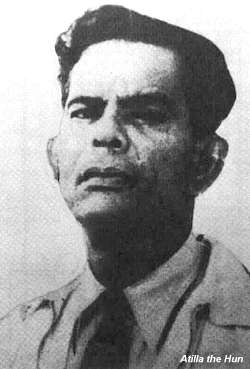 Were Marlborough and Executor,
Were Marlborough and Executor,
And Black Prince Pharaoh
And Edward the Confessor who I knew well
They used to sing mama morial  4
4
Captain Baker was a .....
But today you can hear a Trinidad calypso
On the American radio.
Carnival of long ago was very terrible
And the orgies reprehensible
In those days women sang calypso
Like Sophie Matelonia and Marigold
They used to walk out with bully face  5
5
I mean in the days of canboulay
But today you can hear our Trinidad calypso
On the American radio.
A prophet has no honour in his own land
The truth of that proverb I now understand
When you sing calypso in Trinidad
You are a vagabond and everything that's bad,
In your native land you're a hooligan
In New York you're an artist and a gentleman
For instance take Lion and me
Having dinner with Rudy Vallee.
In other recordings he celebrated the famous stick-fighters, such as 'Archie Boulay' and 'Man Man Briscoe' as well as the kalinda about the unlamented prison warden 'Congo Bara'.
Congo Bara  c
c
Prisonnier levez,
Nettez lunieres bai Congo Bara [x 2]
Judge and jury go try you for murder.
This song is particularly interesting for its mixture of French patois and English. The earliest documented calypsos appear to have been in French and the chantwells that led the carnival bands sang predominantly in patois. Although the transition to English started about 1860 with Cedric Le Blanc, of recorded calypsonians Julian Whiterose was credited with the growth of the English language calypso. The calypsonians developed alongside the bands and by 1900 were singing in carnival tents where a tradition of calypso wars later emerged to decide the Carnival calypso that is still carried on today.
Outside the Carnival period calypsonians played and entertained on the streets and at parties, supplementing their income by selling song sheets of their compositions. Unfortunately, although many were interviewed, biographical information on most calypsonians is scarce, although hopefully current research will shed more light on the singers. There has however been considerable work done on the origin of the word calypso. [Crowley (1959 & 1966) and Hill (1967)]
It is now generally agreed that the term calypso can be traced to a West African source, but as with most New World usages, it survived because of the close parallel meanings in the various languages which contributed to the language of Trinidad.  6
6 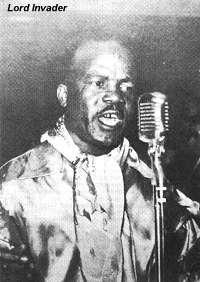 The African source is seen as coming from the Hausa (a Nigerian people who contributed to the West Indian slave traffic and who were later brought to Trinidad as labourers between 1839 and 1860) and can be traced to the term kaico or kaito which is an expression of feeling, normally of pity but also of encouragement. The term kaiso in Trinidad appears as a term of approval and encouragement along side its derivative calypso. The other languages of Trinidad also contributed to the word's retention and derivation. Thus French, which formed the basis of the early patois, contributed the Creole carrousseaux from: the old French term carrousse which meant a drinking party or festivity. The Spanish-Venezuelan Creole term caliso meaning a topical song and even the Carib word carieto meaning a joyful song also contributed to the linguistic mix in Trinidad that produced the term calypso.
The African source is seen as coming from the Hausa (a Nigerian people who contributed to the West Indian slave traffic and who were later brought to Trinidad as labourers between 1839 and 1860) and can be traced to the term kaico or kaito which is an expression of feeling, normally of pity but also of encouragement. The term kaiso in Trinidad appears as a term of approval and encouragement along side its derivative calypso. The other languages of Trinidad also contributed to the word's retention and derivation. Thus French, which formed the basis of the early patois, contributed the Creole carrousseaux from: the old French term carrousse which meant a drinking party or festivity. The Spanish-Venezuelan Creole term caliso meaning a topical song and even the Carib word carieto meaning a joyful song also contributed to the linguistic mix in Trinidad that produced the term calypso.
A similar cultural mixture is to be found in the music associated with early calypso recordings. Although the African rhythm predominates, the melodies have been strongly influenced by Spanish music through nearby Venezuela. In early recordings many calypsos were musically identified as paseos, a popular Venezuelan dance, and elements of English, French and even Irish music are identifiable, as well as the common thread that links the music of the Caribbean to that of New Orleans.
The recording of Trinidad's music started very early. Victor recorded Lovey's Trinidad String Band in New York in 1912 and in 1914 visited the island and recorded Lionel Belasco, Jules Sims with a bamboo-tamboo group and the very early calypsonian Julian Whiterose (or J Resigna) singing double and single tone calipsoes [sic].  7 In the US recording continued throughout the Twenties of calypsonians who had emigrated there after the First World War. These included Johnny Walker, Sam Manning and Wilmoth Houdini who often performed with the calypso orchestras led by Belasco, Gerald Clark and Cyril Monrose. Various traders in Trinidad distributed these recordings but in 1933 Edward Sa Gomes, a local businessman, arranged for Atilla and Lion (Hubert Raphael Charles) to record in the States and in 1934 they recorded extensively for ARC accompanied by the Gerald Clark Orchestra. The following year Atilla, Beginner (Egbert Moore) and Tiger (Neville Marcano) returned to record for Decca and to start the long association between Decca and calypso. The impact of these recordings was considerable both in Trinidad and the States with the calypsonians guesting with Bing Crosby and Rudy Vallee and with radio broadcasts of Atilla and Lion being beamed from the States to Trinidad.
7 In the US recording continued throughout the Twenties of calypsonians who had emigrated there after the First World War. These included Johnny Walker, Sam Manning and Wilmoth Houdini who often performed with the calypso orchestras led by Belasco, Gerald Clark and Cyril Monrose. Various traders in Trinidad distributed these recordings but in 1933 Edward Sa Gomes, a local businessman, arranged for Atilla and Lion (Hubert Raphael Charles) to record in the States and in 1934 they recorded extensively for ARC accompanied by the Gerald Clark Orchestra. The following year Atilla, Beginner (Egbert Moore) and Tiger (Neville Marcano) returned to record for Decca and to start the long association between Decca and calypso. The impact of these recordings was considerable both in Trinidad and the States with the calypsonians guesting with Bing Crosby and Rudy Vallee and with radio broadcasts of Atilla and Lion being beamed from the States to Trinidad.
The success of this trip prompted regular recording trips both to the States and to Trinidad and Sa Gomes dominated the calypso market in Trinidad. The following year the Keskidee Trio (Beginner, Tiger and Atilla)  8 recorded Sa Gomes' Emporiums, the first of a number of records dedicated to him and his business.
8 recorded Sa Gomes' Emporiums, the first of a number of records dedicated to him and his business.
Sa Gomes' Emporiums
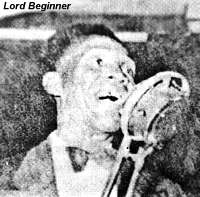 (Chorus)
(Chorus)
For records of quality
Better sung, closer harmony
Tell the population run down
To any of Sa Gomes' Emporiums.
(Beginner)
If you are passing in Frederick Street
Sa Gomes' Emporium you're bound to meet
Charlotte Street and San Fernando
He sells the best records is what we know.
(Tiger)
He's a gentleman of tenacity
He treats you with the greatest hospitality
He selling so cheap, he's ready to give
Just because he's loyal to where he live.
(Atilla)
I'll tell you something you can't deny
With Sa Gomes' telescope you can peep in the sky
You can examine all of the stars
And tell the difference between Jupiter and Mars.
(Beginner)
Gramophones at the lowest price
Electric light to make your bikes nice
And when you want to walk out at night
He can always give you a good torch light.
(Atilla)
Our accompany is a clever lad
Mr Gerald Clark from Trinidad
Who has organised an orchestra
That is tearing brass in America.
(Tiger)
Machines and guitar strings you can get from Sa Gomes
Radios, cash and on easy terms
So tell the population run down
To any of Sa Gomes' Emporiums
(Beginner)
When you want to hear music play
With good records to break away
Gerald Clark will give you the tune
On the English and the American gramophones.
This 'advertising' was continued by Lionel Belasco in 1937, the Lion and the Carnival Vagabonds in 1938 and by 1939 calypsonians were being accompanied by the Sa Gomes Rhythm Boys!
For a short period other traders challenged Sa Gomes' superiority and a calypso war broke out with the rivals reporting one another to the Colonial authorities for importing obscene records. 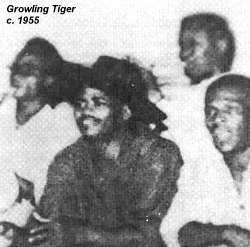 The records were consequently seized and dumped at sea and apparent censorship was imposed. This, of course, was celebrated in calypso in 1938 by Atilla's The Banning of Records and Executor The Censoring of Calypso Makes us Glad - both ironically unissued. The lyrical content of calypso has always caused problems but in the 1930s it is difficult to find any calypso which is as suggestive as the blues recordings of the period, although this might reflect the tighter control of the Colonial authorities. Subsequent debates on calypso content, however, have tended to side with the Colonial authorities and emphasise their suggestive content and in particular their anti-women content. In many respects this would appear to be unfair on this period of calypso recording although it is truer of the 1950s. One of the key characteristics of calypsos is that their range of subject matter is far wider than a comparable music form, such as the blues. [The longest discussion of calypso content is to be found in Elder, J D (1968) and Austin, R L (1976)]
The records were consequently seized and dumped at sea and apparent censorship was imposed. This, of course, was celebrated in calypso in 1938 by Atilla's The Banning of Records and Executor The Censoring of Calypso Makes us Glad - both ironically unissued. The lyrical content of calypso has always caused problems but in the 1930s it is difficult to find any calypso which is as suggestive as the blues recordings of the period, although this might reflect the tighter control of the Colonial authorities. Subsequent debates on calypso content, however, have tended to side with the Colonial authorities and emphasise their suggestive content and in particular their anti-women content. In many respects this would appear to be unfair on this period of calypso recording although it is truer of the 1950s. One of the key characteristics of calypsos is that their range of subject matter is far wider than a comparable music form, such as the blues. [The longest discussion of calypso content is to be found in Elder, J D (1968) and Austin, R L (1976)]
Much more attention should be paid to the topicality of calypsos because calypsonians took every opportunity to comment on both national and international events. Many of the events, of course, are now forgotten and since the cleverness of the lyrics is much of the attraction of a calypso it is understandable that those that refer to universal themes such as male/female relationships should attract most attention. It is of course possible to identify calypsos which emphasise this area both in a particularistic mode and in a universalistic mode. Atilla recorded this 'warning' about women in 1935.
Women Will Rule the World  c
c
I'm offering a warning to men to take care
Of Modern women beware [x 2]
Even the flappers we cannot trust
For they're taking our jobs from us
And if you men don't assert control
Women will rule the world.
Now different are the ladies of the long ago
To the modern women we know
If you've observed you have bound to see
The sex has changed entirely.
Long ago their one ambition in life
Was to be a mother and wife
But now they mean to (?) the males
Smoking cigarettes and drinking cocktails.
Long ago the girls used to be school teachers
Then they became stenographers.
We next hear of them as lecturers
Authors and engineers
There is no limit to their ambition
They've gone in for aviation
And if you men don't assert control
Women will rule the world.
They say anything that man can do
They also can achieve too
And they've openly boasted to do their part
In literature and art
We will next hear of them as candidates
For the President of the United States
So I'm warning you men to assert control
Or women will rule the world.
If women ever get the ascendancy
They will show us no sympathy
They will make us strange things, goodness knows
Scrub floors, even wash clothes
If these tyrants speak as our masters
We'll have to push perambulator,
And in the night as they go to roam
We'll have to mind the baby at home.
... and the Lion commented on the 'origin' of the problem:
Fall of Man  c
c
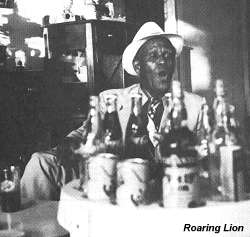 In typical phraseology
In typical phraseology
I comment on the fall of humanity. [x 2]
When Adam disobeyed his Maker's behest,
By yielding to temptation at Eve's request,
Through the abuse of the divine providence
Mankind was doomed to suffer death and pestilence.
When the Creator Adam's loneliness did perceive
As his companion he gave him the woman Eve
Passion Adam grips while he is eating
She was the kind to bring death and disgrace to him
And through his own moral incapacity
He eat the fruit of the forbidden tree,
Through the abuse of divine providence
Mankind is doomed to suffer death and pestilence.
In a state of innocence he was made
He was the sole monarch of all he surveyed
Endowed with free will and understanding
These were the gifts the Creator bestowed on him
But the virtue of obedience he sorely lacked
And from the Garden of Eden he was promptly sacked
Through the abuse of divine providence
Mankind is doomed to suffer death and pestilence.
As he awoke to a realisation of the facts
That what he had done was an erroneous act
A consciousness of guilt overshadowed him
What he had done was termed original sin
He became susceptible to evil
And his instincts became dishonourable
Through the abuse of divine providence
Mankind is doomed to suffer death and pestilence.
And the Lord for the Nation did to him speak
"Tribulation thou shalt suffer for being so weak"
The sentence he passed on him ended thus
"Dust thou art and shall return unto dust"
Sorrows and strifes between all nations
Has been the lot of successive generations
Through the abuse of divine providence
Mankind was doomed to suffer death and pestilence.
However, it is their lyrical fluency and cleverness which characterise the calypso often giving them such a heavy sense of irony and parody that the singer could almost be saying the opposite.
Others are more particularistic as in Lion's use of an old children's ring game in Sally Sally Water  c recorded in 1937.
c recorded in 1937.
Sally Sally Water
(Chorus)
Sally Sally Water sprinkled in a saucer
Ride Sally ride, Sally Sally water
Well when I bumped with a craft, [girl]
And she was a wealthy dame
You can imagine how the Lion made his name.
Even the songs performed in the famed calypso wars between singers in the Carnival tents were sometimes about women as in Atilla and Lion's Mamaguille  9 recorded in 1934.
9 recorded in 1934.
Mamaguille
(Atilla)
Lion, my boy, you ain't got no shame
To have played me such a dirty game
I took you and made you my bosom friend
And that is the wag you act unto the end
You're unconscionable and you got no soul
You stole my only girl in the world
I wonder why you tried such a screw
To mamaguille me and take me wife too.
(Lion)
Atilla, my man, I'm not to blame
It's simply a woman that had no shame
And if you reasonably look back
You of yourself would see your woman was slack
I'm quite conscientious so I must say
That if me brother wife slip she won't get away
For unto him the same I will do
Mamaguille him and take his wife too.
(Atilla)
Even admitting the girl was slack
Lion, my boy, you should have looked back
Some of mg goodness you should recall
And don't give me such a had crutch-fall
But you are uncultured and you are crude
And you are devoid of all gratitude
And that is why you tried such a dirty screw
To mamaguille me and take me wife too.
(Lion)
Well, don't you mention goodness at all
For any man see that woman would fall
Her differential is big, lofty and fat
Oh lors, oh lors, I never see a beast like that
She offered she bump and bounce it on me
Well, how the deuce I could have lost such opportunity
And that is why I used up a screw
To mamaguille you and take your girl too.
But it is also true that the calypso combats were as often as not about the calypsonians themselves as in War  a by Executor, Caresser, Atilla and Lion, which as part of a continuing verbal campaign against Wilmoth Houdini who in 1934 had issued his own War Declaration:
a by Executor, Caresser, Atilla and Lion, which as part of a continuing verbal campaign against Wilmoth Houdini who in 1934 had issued his own War Declaration:
War Declaration
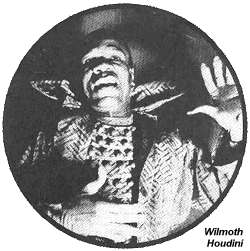 Cable in the morning and tell them I am coming
Cable in the morning and tell them I am coming
So they better prepare for war [x 2]
War declared at the break of day
On the Lion and Atilla and the Lord Executor
War declared!
People listen attentively
I can prove that it is only through jealousy
Songsters dislike Papa Houdini
And I know it is through my ability
Just listen to the songsters all around the town
How they are criticising Houdini's sound
They have got the wrong conception of a born calypsonian
War declared!
When I came home 1929
The songsters declared that I must not shine
They follow me all around the town
And every day they try to bawl me down
People listen attentively
Can't you see it's only through jealousy
That is why they make the scandal about me deportations
War declared!
When they hear me singing my characteristic songs
From the book of perditions which last so long
The volubility that is placed in me
It is owing to my high-class propensity
I am not versed in psychology
But I can sing intelligently
And I can last on my journey
To the end of destiny
War declared!
Houdini, who lived predominantly outside Trinidad seemed to have infuriated the local calypsonians who responded over a period of years. The group reply referred to above was only one of many and Executor recorded his reply in 1937.
We thought Houdini was a clever lad
But his reputation was very bad. [x 2]
At the Olympic theatre show they came to know
That this man was a lavabo (washcloth)
Look here, me lad, that ballad,
No good in Trinidad.
What is apparent, however, is that even though calypsos were often directed against women and human frailty, a large number were noted for their topical and political content. Atilla recorded a large number of political commentaries such as Treasury Scandal and The Governor's Resignation. Atilla himself entered politics and served as a City Councillor, Deputy Mayor and as a member of the Legislative Council. Although overt political commentary occurred, much of the politics was ambivalent as in Tiger's Worker's Appeal recorded in 1936.
Worker's Appeal
Anywhere you go you must meet people sad
They search for employment, none can be had, [x 2]
They start to drop down dead in the street
Nothing to eat and nowhere to sleep
Our kind-hearted employers I appeal now to you
Give us some work to do.
We are not asking for equality
To rank with the rich in society
To visit their hones in their motorcars
Or to go to their clubs and smoke their cigars
We are asking for a living wage
To exist now and provide for old age
Our kind-hearted employers I appeal now to you
Give us some work to do.
Many a day persons haven't a meal
They were too decent to beg, too honest to steal
They went looking for work mostly everywhere
But saw signboard marked 'No Hands Wanted Here'
The Government should work the wastelands and hills
Build houses, factories and mills
Reduce taxation and then we would be really
Emancipated from slavery.
The legislators only quarrel and fret
About unemployment but haven't relieved us yet
There is no vision that we can see
So take us out from tribulations and misery
We can't fight physically for we wouldn't prevail
On account of ammunition, cruel laws and jail
But every man was born to be free
From this oppression and tyrannic slavery.
The ambivalence of the political commentary is seen also in the patriotic attitude to the British Royalty, a favourite topic of the calypsonians. Atilla's 1935 recording of Duke and Duchess of Kent  d is typical.
d is typical.
Duke and Duchess of Kent
(verses 1, 2 & 4)
Trinidadians regard with pride
The visit of the Prince and his bride. [x 2]
With banners flying happy and gay
The whole island was on holiday
And it seems everyone was bent
On welcoming the Duke and Duchess of Kent.
The Duke of Kent, who is King George's son
Had recently his honeymoon tour begun
With Marina his Grecian Princess
Whom we hope brings him happiness
She captivated us with her lovely charm
And we received her with welcome arms
For everyone was bent
On welcoming the Duke and Duchess of Kent.
At Government House there was a party
To welcome their Royal Company
All of Trinidad's aristocracy
Paid tribute to Royalty
We hope when they're thousands of miles away
That something good on the subject of Trinidad they
And will speak of our loyalty, will say
To King George, his most Gracious Majesty.
Atilla also celebrated Roosevelt's trip to Trinidad:
Roosevelt in Trinidad  d
d
When Roosevelt came to the Land of the humming bird
Shouts of welcome were heard, [x 2]
His visit to the island is bound to be
An epoch in local history
Definitely marking the new era
Between Trinidad and America.
Enthusiasm and Jubilation
Was evinced by the entire population
Friendship for the USA was shown
And from the house the Stars and Stripes were flown
Port of Spain threw open the gates
To the President of the United States
In fact everybody was glad
To welcome Roosevelt to Trinidad.
Oh, we were privileged to see, the Democratic
President of the Great Republic
With his charming and genial personality
And his wonderful urbanity
We were struck by his modest style
And was intrigued by the famous Roosevelt smile
No wonder everyone was glad
At the great honour shown Trinidad.
We understand that the President had just been
On a visit to Brazil and the Argentine
With Mr Cordell Hull in attendance
There they took part in a peace conference
To stop war and atrocity
And make the world safe for democracy
The greatest event of the century
In the interests of suffering humanity.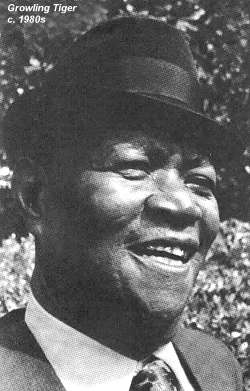
The outbreak of the Second World War led to Carnival being stopped in 1942 but although an attempt was made to stop calypsos, they continued and the War provided an abundance of subject matter for calypsonians. Most events of the War were documented from Mussolini's invasion of Ethiopia to the effects on Trinidad's economy and of course the effects of American and British troops being stationed in Trinidad. (Many commentators date the misogyny of the later calypsos from this period).
The war itself broadened the audience for calypso and the Post-war period saw another boom in calypso which extended into the Fifties and spread the recordings again into the US and the UK. Many of the calypsonians migrated to the States and the UK, and were recorded for the growing West Indian market in those countries. Today calypso is found throughout the West Indies and continues to evolve as a vital musical form. The Golden Age of Calypso is only part of the story of this tradition.  10
10
Notes:
The letter references refer to the reissue of the cited recording, below:
(a) The Real Calypso. Folkways RBP 13.
(b) The Real Calypso, Volume 2. 'Send Your Children to the Orphan Home'. Folkways RF 4
(c) Kaiso! Ethnic Cassettes KA1
(d) Kaiso! Volume 2. Ethnic Cassettes KA2
- This is a phonetic rendering, the precise meaning is unclear.
- This was a Carnival band.
- A shak shak is a shaken rattle. At present a vera is unidentified but may be the same as the baha, a long hollow pipe played as a rhythm instrument in St Lucia. [Midgett, 1977]
- A phonetic transcription. The precise meaning is unclear.
- A grimace.
- For a similar account of a survival see Hall and Noblett (1979).
- 'Single tone' refers to verse length that is four lines to a stanza. This was the form of the Kalinda that was taken into calypso. Congo Bara is 'single tone'. 'Double tone' are the eight line stanzas of the more ballad-like calypso.
- A keskidee is a common West Indian bird.
- Mamaguille is patois for deceive.
- Warner (1983) documents the period from Independence and the dominance of Sparrow. The Post-war up to the Fifties remains undocumented.
Bibliography:
- Austin, R L (1976) 'Understanding Calypso Content: A Critique and an Alternative Explanation'. Caribbean Quarterly, Vol. 22, Nos. 2 & 3, pp. 74-83.
- Crowley D J (1959) 'Towards a Definition of Calypso'. Ethnomusicology. Vol. 3, No. 2 pp. 57-66, No. 3. pp. 117-124.
- Crowley, D J (1966) 'Folk Etymology and the Earliest Documented Usage of 'Calypso'' Ethnomusicology, Vol. 10, No. I, pp. 81-82.
- Elder, J D (1968) 'The Male/Female Conflict in Calypso'. Caribbean Quarterly, Vol. 14, No. 3, pp. 23-41.
- Hall, B & Noblett, R A (1979) 'The Birth of the Boogie'. Blues Unlimited, No. 133, January/February, pp. 10-11.
- Hill, E (l967) 'On the Origin of the Term Calypso'. Ethnomusicology, Vol. 11, No. 3, pp. 359-367.
- Midgett, D K (1977) 'Performance Roles and Musical Change in a Caribbean Society'. Ethnomusicology, Vol. 21, No. 1, pp. 55-73. 0
- Pearse, A (1956) 'Mitto Sampson on Calypso Legends of the 19th Century'. Caribbean Quarterly, Vol. 4, Nos. 3 & 4, pp. 250-262.
- Warner, K (1983) The Trinidad Calypso. Heinemann.
Richard Noblett
Article MT099
Site designed and maintained by Musical Traditions Web Services Updated: 3.10.02
 The calypsonians with their exotic names, clever lyrics and infectious rhythms have periodically erupted onto the US and British music scenes and, even now, popular Carnival records make their way regularly to North America and the UK. Calypso, however, has had a number of booms before, primarily in the 1930s and the 1950s. The 1930s is often represented as the 'Golden Age of Calypso' and it was during this period that the first extensive recording of calypso by US companies was carried out.
The calypsonians with their exotic names, clever lyrics and infectious rhythms have periodically erupted onto the US and British music scenes and, even now, popular Carnival records make their way regularly to North America and the UK. Calypso, however, has had a number of booms before, primarily in the 1930s and the 1950s. The 1930s is often represented as the 'Golden Age of Calypso' and it was during this period that the first extensive recording of calypso by US companies was carried out.
 Were Marlborough and Executor,
Were Marlborough and Executor, The African source is seen as coming from the Hausa (a Nigerian people who contributed to the West Indian slave traffic and who were later brought to Trinidad as labourers between 1839 and 1860) and can be traced to the term kaico or kaito which is an expression of feeling, normally of pity but also of encouragement. The term kaiso in Trinidad appears as a term of approval and encouragement along side its derivative calypso. The other languages of Trinidad also contributed to the word's retention and derivation. Thus French, which formed the basis of the early patois, contributed the Creole carrousseaux from: the old French term carrousse which meant a drinking party or festivity. The Spanish-Venezuelan Creole term caliso meaning a topical song and even the Carib word carieto meaning a joyful song also contributed to the linguistic mix in Trinidad that produced the term calypso.
The African source is seen as coming from the Hausa (a Nigerian people who contributed to the West Indian slave traffic and who were later brought to Trinidad as labourers between 1839 and 1860) and can be traced to the term kaico or kaito which is an expression of feeling, normally of pity but also of encouragement. The term kaiso in Trinidad appears as a term of approval and encouragement along side its derivative calypso. The other languages of Trinidad also contributed to the word's retention and derivation. Thus French, which formed the basis of the early patois, contributed the Creole carrousseaux from: the old French term carrousse which meant a drinking party or festivity. The Spanish-Venezuelan Creole term caliso meaning a topical song and even the Carib word carieto meaning a joyful song also contributed to the linguistic mix in Trinidad that produced the term calypso.
 (Chorus)
(Chorus) The records were consequently seized and dumped at sea and apparent censorship was imposed. This, of course, was celebrated in calypso in 1938 by Atilla's The Banning of Records and Executor The Censoring of Calypso Makes us Glad - both ironically unissued. The lyrical content of calypso has always caused problems but in the 1930s it is difficult to find any calypso which is as suggestive as the blues recordings of the period, although this might reflect the tighter control of the Colonial authorities. Subsequent debates on calypso content, however, have tended to side with the Colonial authorities and emphasise their suggestive content and in particular their anti-women content. In many respects this would appear to be unfair on this period of calypso recording although it is truer of the 1950s. One of the key characteristics of calypsos is that their range of subject matter is far wider than a comparable music form, such as the blues. [The longest discussion of calypso content is to be found in Elder, J D (1968) and Austin, R L (1976)]
The records were consequently seized and dumped at sea and apparent censorship was imposed. This, of course, was celebrated in calypso in 1938 by Atilla's The Banning of Records and Executor The Censoring of Calypso Makes us Glad - both ironically unissued. The lyrical content of calypso has always caused problems but in the 1930s it is difficult to find any calypso which is as suggestive as the blues recordings of the period, although this might reflect the tighter control of the Colonial authorities. Subsequent debates on calypso content, however, have tended to side with the Colonial authorities and emphasise their suggestive content and in particular their anti-women content. In many respects this would appear to be unfair on this period of calypso recording although it is truer of the 1950s. One of the key characteristics of calypsos is that their range of subject matter is far wider than a comparable music form, such as the blues. [The longest discussion of calypso content is to be found in Elder, J D (1968) and Austin, R L (1976)]
 In typical phraseology
In typical phraseology Cable in the morning and tell them I am coming
Cable in the morning and tell them I am coming